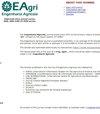DISCRETE ELEMENT-BASED DESIGN OF KEY PARAMETERS FOR WHEEL RUT TILLAGE DEVICES
IF 0.8
4区 农林科学
Q3 Agricultural and Biological Sciences
引用次数: 0
Abstract
In this study, a device was designed for tillage of compacted soil in wheel ruts formed by the repeated passage of agricultural machines.[Ed1] Soil parameters were measured, and then the wheel rut tillage device was divided into two parts, the soil lifting unit and the soil breaking unit, for separate simulation tests to study the tillage process. EDEM[Ed2] simulations were applied to the soil lifting device to compare and analyze the microscopic movement of the simulated soil particles and the operational resistance of the device. Analysis of variance (ANOVA) was performed using Design-Expert10 [Ed3] software to obtain the optimum combination of parameters of 125 mm device offset distance, 43.6° entry angle and 28° lifting angle. A full-factor test was conducted on the soil crushing device using EDEM coupled with RecuDyn multi-body system dynamics simulation software. The number of bond breaks and the traction resistance of the soil crushing device were used as the test indicators, and the optimum parameters were obtained for a soil crushing knife blade thickness of 6 mm and a cutting edge angle of 30° for the largest number of bond breaks and least traction resistance. The results of this study will provide technical support for the reduction of compaction zones in wheel ruts after tire travel on agricultural machinery in real time.基于离散元的轮轨耕作装置关键参数设计
本研究设计了一种耕作装置,用于耕作由农业机械反复通过形成的轮辙中压实的土壤。[Ed1]测量土壤参数,然后将轮辙耕作装置分为提土单元和破土单元两部分,分别进行模拟试验,研究耕作过程。将EDEM[Ed2]模拟应用于土壤提升装置,对比分析模拟土壤颗粒的微观运动和装置的运行阻力。采用Design-Expert10 [Ed3]软件进行方差分析(ANOVA),获得125 mm装置偏移距离、43.6°进入角和28°提升角的最佳参数组合。利用EDEM和RecuDyn多体系统动力学仿真软件对土壤破碎装置进行了全因素试验。以土壤破碎装置的断裂次数和牵引阻力为试验指标,得到了土壤破碎刀刃厚度为6 mm、刃口角为30°时断裂次数最多、牵引阻力最小的最佳参数。研究结果将为实时减少农机轮胎行驶后车辙压实区提供技术支持。
本文章由计算机程序翻译,如有差异,请以英文原文为准。
求助全文
约1分钟内获得全文
求助全文
来源期刊

Engenharia Agricola
Agricultural and Biological Sciences-Agricultural and Biological Sciences (miscellaneous)
CiteScore
1.90
自引率
20.00%
发文量
62
审稿时长
6 months
期刊介绍:
A revista Engenharia Agrícola existe desde 1972 como o principal veículo editorial de caráter técnico-científico da SBEA - Associação Brasileira de Engenharia Agrícola.
Publicar artigos científicos, artigos técnicos e revisões bibliográficas inéditos, fomentando a divulgação do conhecimento prático e científico na área de Engenharia Agrícola.
 求助内容:
求助内容: 应助结果提醒方式:
应助结果提醒方式:


